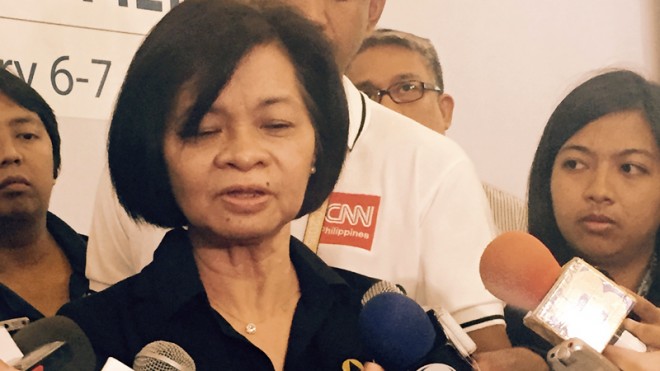Inclusive economies, growth, resilient communities on agenda of Apec meet

Foreign affairs undersecretary Laura del Rosario, Senior Officials’ Meeting chair. Nestor Corrales/INQUIRER.net
CLARK, FREEPORT ZONE, Philippines—”How can we make sure no one is left behind?”
This was the gist of the two-day Senior Officials’ Meeting (SOM) of the 21-member countries of the Asia-Pacific Economic Cooperation (Apec) at the Fontana Convention Hall in Clark, Pampanga, on Feb. 6-7.
Foreign Affairs Undersecretary Laura del Rosario, chair of the SOM, said the two-day meeting laid the foundation for building more “inclusive economies” across Asia-Pacific.
Del Rosario said the inclusive economies would strengthen trade and investment while ensuring the benefits were felt by as many people and businesses as possible.
Del Rosario pointed out the “lack of inclusive growth,” which was highlighted during the meeting.
Article continues after this advertisementShe said inclusive growth had been the main objective of the Philippine government.
Article continues after this advertisementThe DFA official cited four key aspects to ensure inclusive growth across Asia-Pacific, which includes priorities on economic integration, human capital development, fostering small-medium enterprises, and building sustainable and resilient communities.
Del Rosario said that to invest in capital development, “we have to improve our educational system.”
In the Philippines, she said that the country’s greatest challenge in achieving inclusive growth is not having a “disciplined educational system.”
She announced that Apec had launched a scholarship and internship initiative to allow students and professionals to enjoy greater access to cross-border education, training and internship in the Asia-Pacific region.
She said Apec economies should be known as education providers, citing universities in the Asia-Pacific region were “among the best.”
“We target one million students roaming around the Apec region by the year 2020,” she said.
According to her, Philippine universities will also participate in the Apec scholarship program.
Building resilient communities
Del Rosario said building sustainable and resilient communities was also a priority of Apec.
She recalled the disasters that hit the Philippines like Supertyphoon “Yolanda” (Haiyan), the tsunami in Japan, the massive flooding in Bangkok, among others.
She said these disasters disrupted not only businesses, economies and livelihood but also the lives of so many people.
Resilient infrastructure, transport system and telecommunications, she said, would help build sustainable communities.
The DFA official said that Apec was also looking on “workability in the cities” or urbanization and its effect on economies.
“We need to look at our transportation system to reduce commuting time,” she said.
She said Japan was willing to give the Philippines standards on building resilient infrastructure and offer our engineers training.
“We don’t talk in terms of money, we talk in terms of projects,” she said, adding that Apec was a project- and policy-oriented body.
Terrorism threat
Del Rosario said terrorism had always been in the agenda of Apec since the Sept. 11 attack in the United States.
“What will happen if our economies are threatened?” she said.
“This is why we are looking at secure economic growth and trade,” she added.
She mentioned that coordination on government rules among Apec member economies had also been tackled, citing government regulations affect production.
“They should not destroy the industry,” she said.
She also said that Apec was also looking at the broader agenda on how the delivery of goods and services could be improved.
“When we talk about connectivity, we’re not just talking about ports, bridges and roads, but also services,” she said.
Since Jan. 26, the various technical groups, committees and senior officials of the 21-member economies of Apec have met to discuss initiatives, policies and capacity-building that advances Apec’s objectives.
The Apec Senior Officials’ Meeting is being held at the Clark and Subic freeport zones from Jan. 26 to Feb. 7.
Aside from Clark, other key cities and places in the country will host Apec events, including Cebu, Davao, Iloilo, Boracay and Tagaytay, among others.
Apec has 21 member economies, which includes Australia, Brunei Darussalam, Canada, Chile, People’s Republic of China, Hong Kong, Indonesia, Japan, Republic of South Korea, Malaysia, Mexico, New Zealand, Papua New Guinea, Peru, Republic of the Philippines, Russia, Singapore, Chinese Taipei (Taiwan), Thailand, the United States, and Vietnam.